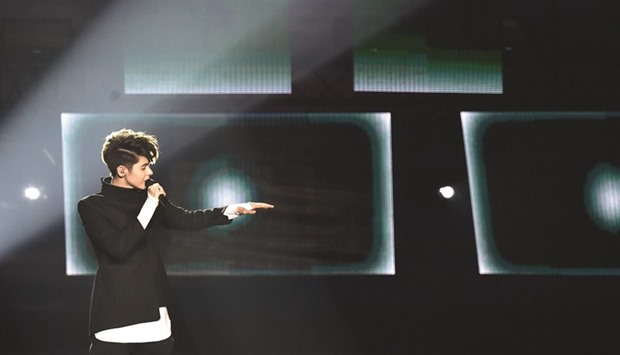Italy and Portugal were the frontrunners going into last night’s final of the Eurovision Song Contest, an annual song and dance fest – held in Kiev this year – whose global audience topped 200mn people last year.
Italian Francesco Gabbani is leading the pack with a number, viewed nearly 114mn times on YouTube, that mixes Buddhist imagery with a dancing ape, and he explains as poking fun at the West’s superficial embrace of eastern culture.
Vying for first place is Portugal’s Salvador Sobral, performing a jazz-style ballad written by sister Luisa.
According to the bookmakers, third favourite is Bulgaria’s Kristian Kostov, the youngest entrant at 17.
Ukraine is hosting the competition while the country is fighting a war, hundreds of kilometres away in the east, against Russian-backed separatists, after its Crimean Tatar entry Jamala won the competition last year.
On Kiev’s Independence Square, a billboard went up listing nine Ukrainian soldiers killed this month, with the slogan: “This is the price we paid for every single day we lived in peace.”
“This was put up for Eurovision, to remind guests that not all is well in Ukraine,” said a spokeswoman for Ukraine crisis media centre.
The elephant in the room at Saturday’s contest is Russia, which is boycotting the event after Ukraine barred Moscow’s contestant Yuliya Samoilova from entering the country – a symptom of the countries’ toxic relations after Russia’s annexation of Crimea in 2014.
Both countries ignored pleas from organisers, the European Broadcasting Union, and Russia has refused to air the contest, forcing fans to watch online.
Russia has vowed that Samoilova will compete in 2018, putting Ukraine in a tricky dilemma over whether to participate alongside her.
After the Kiev event opened, it emerged that the Bulgarian contestant, Kostov, had also performed in annexed Crimea.
The singer, who has appeared on a Russian television talent show, was allowed to stay because he was only 14 at the time.
He will appear in the final.
Gabbani faced questions at a news conference on Friday about the pressures of being favourite.
“Without any offence, but it has been the biggest pressure for me that I have been asked this question (about being favourite) zillions of times,” he said, speaking through an official translator. “But beside that, I want to be very honest about this – you embrace this experience of Eurovision with the aim of living a great adventure and not necessarily thinking of the first or second place.”
This is the 62nd edition of Eurovision, recognised by Guinness World Records as the longest-running annual TV music competition.
It began in 1956 with just seven countries. Ireland have won the most times – seven in all – following by Sweden.
Other hopefuls this year include Jacques Houdek, known as “Mr Voice” in Croatia, who blends pop and operatic singing styles in the song My Friend.
Romania is fielding a duo that combines rap and yodelling.
Ukraine has won the competition twice, including last year with a song about the mass deportation of Tatars from Crimea by Josef Stalin.
More than 10,000 have been killed in the war between Ukraine and pro-Russian fighters that erupted in 2014.
“And yes, there is a war going on, but it’s further, further out,” said Stephanie Novak, a visiting fan from Australia. “And I think isn’t it the whole point of Eurovision to help bring Europe together? What could be better than bringing Europe to a country that is being so affected by war at the moment and to show them what a beautiful country it is.”

Kostov of Bulgaria performing the song Beautiful Mess during the second semi-final of the Eurovision Song Contest 2017.
